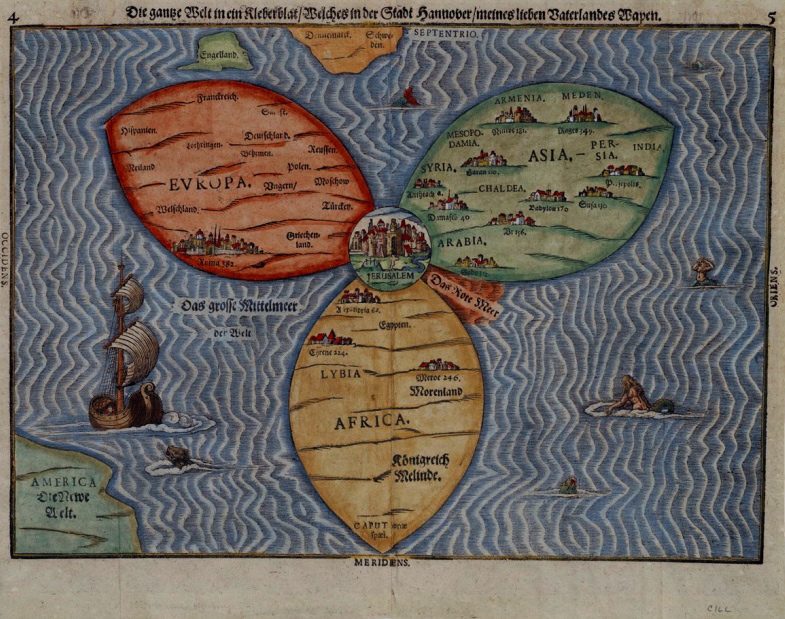Over the past few months we have presented Paul’s Letter to the Romans as a first-rate missionary tract. The Apostle designs the document with a particular purpose in view: he aims to enlist the church in Rome for planting a church in Spain.
But Jerusalem is a part of Paul’s design, too. Paul writes the Letter to the Romans to the Romans, obviously. Yet he seems to feel the sisters and brothers in Jerusalem “looking over his shoulder.” It is plain enough throughout the letter: for the Apostle Paul, Jerusalem matters.
We see how, just a little, in chapter fifteen.
In chapter fifteen, we learn that Paul must make a visit to the Holy City before he embarks for Rome and the Iberian Peninsula. “I am going to Jerusalem in a ministry to the saints,” he explains (v.25). Paul is concerned for the “poor among the saints in Jerusalem” (v.26). He has been traveling about the gentile world collecting an offering for their relief (cf. 2 Corinthians 8:4ff). Now he must deliver the gift by his own hand (v.28).
The task will not be easy: Paul’s relationship with Jerusalem is full of complication. We find him asking the Romans, whom he has never met, to pray for the Jerusalem he knows (perhaps too well!) “Pray that I may be rescued from the unbelievers,” he urges (v.31). Paul apparently had enemies among the unbelieving establishment in Jerusalem. And the believing establishment – the Christian establishment – concerned the Apostle very much, as well. He asks the Romans to pray “that my ministry in Jerusalem may be acceptable to the saints” (vv.30,31). There was some chance, it seems, that the church would refuse the offering he had so graciously gathered among the gentiles.
Jerusalem, of course, was the mother church – the epicenter of the nascent Christian movement. And they knew it. In the book of Acts (ch. 15) we learn that the church in Jerusalem, at the center, tended to disdain the church at the periphery – the sort of people served by Paul. So a “gift” from Achaia (15:26) – wherever that was – must have seemed almost cheeky. What good could come from Achaia?
Much good, in fact. There was much at stake in the offering of the gentiles.
The offering would demonstrate that the “center” of Christian presence in the world had moved. The friends in Jerusalem must come to understand that they share a condition with humans everywhere, in spite of their privilege: they are lost. “Are we [Jews] any better off? No, not at all; for… both Jews and Greeks are under the power of sin…” (3:9). Jewish Christians are no closer to heaven than Roman believers; and unbelieving Romans are no farther away than unbelieving Jews.
The offering would demonstrate the power of God’s gracious remedy for sin. There is one remedy for sin, even for the descendents of Abraham. It is simply “the gospel: the power of God for salvation to everyone who has faith, to the Jew first and also to the Greek” (1:16). There is not one way for gentiles and another for sophisticated Jews. “The one who is righteous will live by faith” (1:17).
And the church in Jerusalem must understand that the righteous live by their faith – that righteous language without righteous living is an impossible contradiction. Paul had harsh words for those who “boast of [their] relation to God” and are “sure that [they] are a guide to the blind, a light to those who are in darkness, a corrector of the foolish, a teacher of children” – who yet dishonor God in their conduct (2:17ff.). “You can get by with almost anything if you front it with eloquent talk about God and his law” (v.23, The Message). Ethical transformation, you see, is not optional – not in Achaia, not in respectable Jerusalem. Especially in respectable Jerusalem, transformation is also required (cf. v.22ff.; 13:11ff.).
Finally, the offering would demonstrate that the church in Jerusalem has something to receive from the gentiles – that Jerusalem in fact is incomplete without the gentiles. It must stand in community with the church in Rome and Achaia. If it is to find its way into the mission of God, it must give up its place at the center.
The Letter to the Romans makes clear that there are no special rules for the sisters and brothers in Jerusalem that do not obtain everywhere. The lost are found by faith in the Lord Jesus Christ. The found are sent by the power of his grace. The sent are commanded by his clear word and equipped by his attending Spirit. And “by the command of the eternal God” (16:26), they aim with Paul “to bring about the obedience of faith among all the gentiles” (1:5).
So Jerusalem matters, all right. But not as an authority, not as the center, not as the model or arbiter of Christian maturity or mission. Jerusalem matters if only it stands unashamed on the gospel (1:16), gripped by the command of the eternal God (16:26), sent to proclaim the good news of redemption in Jesus Christ (15:19). But that is true for Rome and Achaia too. And it is true for you.
[Next month, finally: The Kingdom of God matters…]
Other posts in this Mission Matters series:
